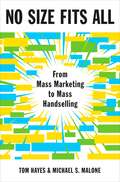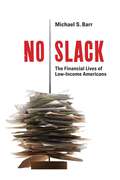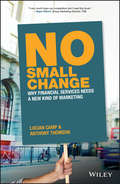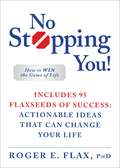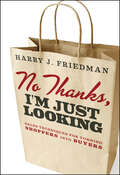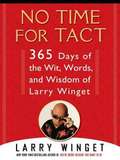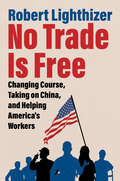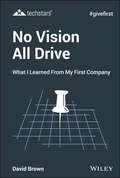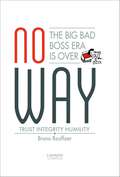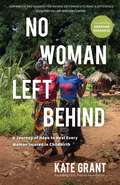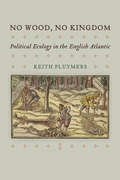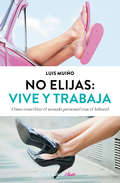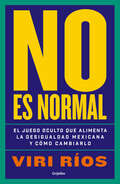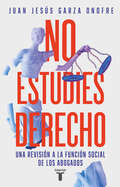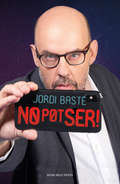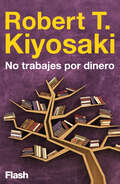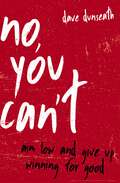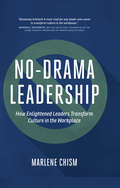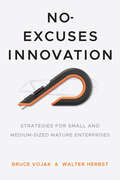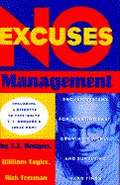- Table View
- List View
No Size Fits All
by Tom HayesToday's markets have splintered into millions of powerful consumer communities- how can businesses adapt? It's no secret that traditional mass marketing- network television, newspapers, direct mail-is dying. Consumer markets are increasingly fragmented, even as they become more connected, transparent, and global. The future of business is about penetrating selfforming niches, from affinity groups on Facebook to thousands of satellite channels and millions of private online communities. So how can businesses reach new customers, win their trust, and earn their loyalty? Tom Hayes and Michael S. Malone urge an entirely new approach, embracing small, trust-based online groups as powerful vehicles for creating customers and gathering invaluable feedback. But what they call "marketing 3. 0" isn't as simple as setting up a YouTube channel. Drawing on many case studies, the authors offer a new set of tools for a world where attention is harder than ever to capture, but even more lucrative to hold. They explain how to use social media for a new kind of marketing-bottom-up instead of top-down, personal rather than public, subtle rather than full frontal. The payoff is a return to the power of oldfashioned handselling-turbocharged by bleedingedge technology.
No Slack
by Michael S. BarrThe financial crisis exposed the potentially unsavory results of the interaction between low- and moderate income households and alternative and mainstream financial institutions. Many households were overleveraged or paid high costs for financial services, while others lacked access to useful financial products that can cushion against economic instability. The financial services system is not well designed to serve low- and moderate-income households, leaving them without financial slack: they did not have adequate breathing room for making the financial adjustments that would permit them to better meet their own needs. No Slack shows us why these families were the least prepared to handle the shock of the deep recession.This pivotal analysis focuses on the Detroit metropolitan area's low- and moderate-income neighborhoods, which are similar to those of other Rust Belt communities. The Detroit Area Household Financial Services study--conducted at the height of the subprime lending boom--examines these households' decisionmaking processes, behaviors, and attitudes toward a full range of financial transactions. No Slack reveals widespread problems in home mortgage lending, the common threads among people who file for bankruptcy, the reasons so many households are unbanked, and how behaviorally informed financial regulation can make the market work better. Drawing on his deep policy experience, Michael Barr advocates helping families seek financial stability in three primary ways: enhancing individuals' financial capability, using technology to promote access to financial products and services that meet their needs, and establishing strong protections for consumers.
No Slack
by Michael S. BarrThe financial crisis exposed the potentially unsavory results of the interaction between low- and moderate income households and alternative and mainstream financial institutions. Many households were overleveraged or paid high costs for financial services, while others lacked access to useful financial products that can cushion against economic instability. The financial services system is not well designed to serve low- and moderate-income households, leaving them without financial slack: they did not have adequate breathing room for making the financial adjustments that would permit them to better meet their own needs. No Slack shows us why these families were the least prepared to handle the shock of the deep recession.This pivotal analysis focuses on the Detroit metropolitan area's low- and moderate-income neighborhoods, which are similar to those of other Rust Belt communities. The Detroit Area Household Financial Services study-conducted at the height of the subprime lending boom-examines these households' decisionmaking processes, behaviors, and attitudes toward a full range of financial transactions. No Slack reveals widespread problems in home mortgage lending, the common threads among people who file for bankruptcy, the reasons so many households are unbanked, and how behaviorally informed financial regulation can make the market work better. Drawing on his deep policy experience, Michael Barr advocates helping families seek financial stability in three primary ways: enhancing individuals' financial capability, using technology to promote access to financial products and services that meet their needs, and establishing strong protections for consumers.
No Small Change: Why Financial Services Needs A New Kind of Marketing
by Anthony Thomson Lucian CampA 13-point manifesto for a new financial services marketing model Anthony Thomson knows a thing or two about new and disruptive financial services, having co-founded and chaired first the ground-breaking Metro Bank and then the purely digital, app-based Atom Bank. And as a financial services marketing specialist for over 30 years, Lucian Camp has helped develop more new and innovative financial services propositions than anyone. Now they’ve put their heads together to write No Small Change, a passionate, opinionated and practical manifesto arguing that the fast-changing financial services world urgently needs to rethink the whole of its approach to marketing. Most of all, they propose that an increasingly digital, fintech-driven industry needs not just more marketing, but also better marketing to make sure it’s successfully identifying consumers’ real needs, and finding powerful and successful ways to engage with them. After detailing the forces of change that demand a new approach, the book then examines in 13 chapters what the key components of that new approach should look like. It takes a broad and multi-faceted perspective, exploring areas as diverse as the crisis of consumer trust, the ever-growing power of Big Data, the importance of leadership and corporate culture and the rapid advance in thinking based on Behavioural Economics. In developing these themes, the authors don’t pull their punches. The book is fiercely critical of some of the industry’s long-established marketing habits, providing compelling reasons why it’s time to abandon the practices that have given it a bad name. Marketers will applaud, but the book is also intended for a broader audience. Thomson and Camp challenge senior management in financial firms to appreciate the real value that marketers can bring to shaping the business agenda at the highest level, and not just to label marketing with that tired old phrase “the colouring-in department.” Rich in anecdotes, comments from leading industry figures, personal experiences on the part of both authors and findings from original research, No Small Change is an entertaining and rewarding read – and, at this point in the development of financial services, a timely and important one.
No Stomach for Second-Best: How Integrative Thinkers Move Beyond Trade-offs
by Roger L. MartinWhat sets integrative thinkers apart? This chapter explores integrative thinking by breaking this thinking process down into its constituent parts.
No Stopping You!: How to Win the Game of Life
by Roger E. FlaxWhy do some people succeed tremendously, feel very good about themselves, and simply can't wait for the next day?While others have all the desire, smarts, talent and motivation to greatly succeed, but something's missing... To respected corporate leadership guru Dr. Roger Flax, the answer is simple: winning the game of life begins and ends with relationships. NO STOPPING YOU! HOW TO WIN THE GAME OF LIFE gives you the playbook, along with actionable tools to determine what makes people tick and how to win them over; how to establish instant rapport, trust and credibility; and how to leverage those qualities into outstanding business and personal success, with strong and long-term "win-win" relationships.Listening to NO STOPPING YOU! is like a one-on-one private session with the highly sought-after expert Dr. Flax, who covers how to:-Effectively communicate with impact, power, clarity.-Drive towards desired, mutually-beneficial outcomes and results.-Persuade, influence, inspire, motivate, and develop all types of people.-Read people quickly, and adapt your communication style effectively and appropriately,-And make things happen.Flax has lived this dream, winning the game many times over, and has shared his insights and strategies with thousands of people for five decades - in seminars, workshops, international presentations, motivational speeches, and through major media. Now it's time for you to learn to apply these powerful, innovative insights and tools, firsthand.This audiobook gives you actionable tools and techniques that you can apply immediately. It's a hands-on, all-in-one playbook and toolbox that gives you strategies and game plans to accomplish your goals.When you do, there's no stopping you! And you're well on the way to winning the challenging, and very exciting, game of life!
No Thanks, I'm Just Looking: Sales Techniques for Turning Shoppers into Buyers
by Harry J. FriedmanSecrets of the trade from the master of retail selling and sales training No Thanks, I'm Just Looking gives anyone the inside scoop on how to skyrocket their selling career with a system of easy-to-learn practical money-making steps. By saving countless hours of trial-and-error experience, readers will be able to focus on the things that really work. Considered to be retail guru Harry J. Friedman's personal collection of proven selling techniques, No Thanks, I'm Just Looking includes all the tips and humorous anecdotes that have made him retail's most sought-after consultant. No Thanks, I'm Just Looking delivers the tricks of the trade from an international retail authority. Author is the most heavily attended speaker on retail selling and operational management in the world These groundbreaking high-performance training systems have been used by more than 500,000 retailers, from small independents to the likes of Neiman Marcus, Cartier, Billabong, La-Z-Boy and Godiva, to routinely deliver more sales Friedman created the number one retail sales and management system used by more retailers than any other system of its kind in the world Get proven techniques that will increase sales and elevate your staff to a high-performance sales team.
No Time for Tact
by Larry WingetIn these uncertain times, business needs a straight-talking dose of Larry Winget's reality-check more than ever. No Time for Tact is a boot camp version of the business advice classic The Daily Drucker (Butterworth-Heinemann, 2004), the ultimate wake-up call for anyone who's looking for a lifeline and true empowerment. Blending longer observations with his signature Winget quips, No Time for Tact is the perfect way to jump-start each day.
No Trade Is Free: Changing Course, Taking on China, and Helping America's Workers
by Robert LighthizerAmerica is the first country in history to fund the rise of its rivals. We need to stop now, before it’s too late. One of the most consequential U.S. Trade Representatives in our history, Robert Lighthizer led a great reset of American trade policy that has endured across Administrations. For more than 40 years, he litigated, negotiated, and editorialized against the failed policies of one-sided free trade as part of both the Reagan and Trump administrations and as a private lawyer. As Trade Representative, he fought against globalists, importers, lobbyists, foreign governments and big businesses whose interests diverged from those of the American workers.For decades, unbalanced “free” trade was the preferred option for the most powerful in Washington, and millions of ordinary Americans paid the price. Instead of prioritizing healthy American communities, good jobs, higher wages, and a promising future for our workers, Washington too often cared more about corporate profits, cheap imports and the concerns of foreign governments, including the Chinese. In return, we got cheaper coffee makers and tee shirts, while thousands of factories closed, wages stagnated, communities deteriorated, economic inequality rose in our country, and we racked up trillions of dollars in trade deficits.Part memoir, part history, and part policy analysis, No Trade is Free tells the story of how America found itself at this point and how the Trump administration took on the orthodoxy of the trade establishment, with astonishing results. With in-depth character sketches of some of the most important leaders of our time—from Donald Trump, to Xi Jinping, to Nancy Pelosi, to Andrés Manuel López Obrador—Lighthizer explains how trade negotiations actually work and why leverage is the key to success—no trade is free.This book is a wake-up call to our politicians, thought leaders, but most importantly, everyday Americans. It presents the case against the policies that have weakened America and left our families and communities behind. It argues for a worker-focused trade policy. It tells the story of our fight for every American job and how for the first time, a US administration took on China. But most importantly, it is a guide to the new world economy—one which will require a worker-focused trade policy.
No Vision All Drive: What I Learned from My First Company (Techstars)
by David BrownMemoirs of an entrepreneur Ever wonder how a startup comes together—the people, places, skills, failures, and hustle that make it a real business? This is the story of David and David, two entrepreneurs with lots of energy and less of a roadmap than you might think. In 1993, David Cohen and David Brown founded their first company, Pinpoint Technologies, which grew from a basement startup to a successful multinational company with $50 million in annual sales and over 250 employees. Chronicling the story of that company from its beginnings up to 1999, when it was sold to ZOLL, and beyond, No Vision All Drive is the story of that company and the people who transformed a flat-broke, shot-in-the-dark concept into a market-leading small business. This book is not about business; it’s about people David and David recount their experiences together Insight on how to build a successful startup Turn a seed idea into reality Startup founders and startup employees, venture capitalists, serial entrepreneurs, and anyone with an interest in stories of determination and hard work will love No Vision All Drive.
No Way: The Big Bad Boss Era is Over
by Bruno RouffaerGreed, hubris and narcissism: qualities that define many leaders and have grown to be part of today's society and structures. Too often these qualities are seen as key ingredients for successful leadership, while they are actually a recipe for disaster. The so-called profit of this type of leadership runs at the expense of ourselves. In this book Bruno Rouffaer encourages leaders to find new motives: altruism, humility, the quest for balance, which see man as a whole and combine sustainable growth with the wellbeing of future generations. No Way advocates change: the Big bad boss era is over!
No Woman Left Behind: A Journey of Hope to Heal Every Woman Injured in Childbirth
by Kate GrantINSPIRATION FOR HOW TO CREATE A LIFE OF PURPOSE, NO WOMAN LEFT BEHIND IS THE UNLIKELY STORY OF HOW ONE WOMAN LEAVES MADISON AVENUE AND TACKLES THE GLOBAL MATERNAL HEALTH CRISIS HEAD ON—PREFACED BY A POWERFUL FOREWORD BY BEST-SELLING AUTHOR ABRAHAM VERGHESE. 2025 International Book Award Winner in Autobiography/Memoir &“In this rousing debut, Grant demonstrates how the faith and actions of a small group of people can save the world.&”—BookLife Reviews, Editor&’s Pick &“A call to action for compassionate advocates, and a stunning tale of how deeds triumph over platitudes.&”—Dr. Denis Mukwege, winner of the Nobel Peace Prize The day a woman gives birth is also the day she is most likely to die or suffer severe injury—a sobering reality that comes into sharp focus when Kate Grant visits the Addis Ababa Fistula Hospital in Ethiopia&’s capital. There, she sees row after row of beds occupied by young women afflicted with obstetric fistula, a childbirth injury that leaves them incontinent and too often shunned by their communities, modern-day lepers. She soon learns that surgery is the only way to end their suffering. In No Woman Left Behind, Grant recounts her decision to abandon a promising advertising career, and the ups and downs of building Silicon Valley–based Fistula Foundation from a modest start-up into the global leader in fistula treatment. Through vivid firsthand accounts of surgeons toiling in remote corners of Africa and Asia, we see inside the fight to restore hope to some of the world&’s most vulnerable women. A compassionate army of donors spanning nearly 70 countries makes such life-changing care possible. Grant demonstrates the profound power of individual action to change lives at scale, since Fistula Foundation takes no government money. No Woman Left Behind is a compelling personal journey and a how-to guide for anyone looking to make a lasting difference in the lives of others. 100% of the net proceeds received by Fistula Foundation from this audiobook will be made available by the Fistula Foundation to Fistula Foundation.
No Wood, No Kingdom: Political Ecology in the English Atlantic (The Early Modern Americas)
by Keith PluymersIn early modern England, wood scarcity was a widespread concern. Royal officials, artisans, and common people expressed their fears in laws, petitions, and pamphlets, in which they debated the severity of the problem, speculated on its origins, and proposed solutions to it. No Wood, No Kingdom explores these conflicting attempts to understand the problem of scarcity and demonstrates how these ideas shaped land use, forestry, and the economic vision of England's earliest colonies.Popular accounts have often suggested that deforestation served as a "push" for English colonial expansion. Keith Pluymers shows that wood scarcity in England, rather than a problem of absolute supply and demand, resulted from social conflict over the right to define and regulate resources, difficulties obtaining accurate information, and competing visions for trade, forestry, and the English landscape. Domestic scarcity claims did encourage schemes to develop wood-dependent enterprises in the colonies, but in practice colonies competed with domestic enterprises rather than supplanting them. Moreover, close studies of colonial governments and the actions of individual landholders in Ireland, Virginia, Bermuda, and Barbados demonstrate that colonists experimented with different, often competing approaches to colonial woods and trees, including efforts to manage them as long-term resources, albeit ones that nonetheless brought significant transformations to the land.No Wood, No Kingdom explores the efforts to knot together woods around the Atlantic basin as resources for an English empire and the deep underlying conflicts and confusion that largely frustrated those plans. It speaks to historians of early modern Europe, early America, and the Atlantic World but also offers key insights on early modern resource politics, forest management, and political ecology of interest to readers in the environmental humanities and social sciences as well as those interested in colonialism or economic history.
No elijas: Cómo conciliar el mundo personal con el laboral
by Luis MuiñoUn método práctico y resolutivo para conciliar la vida laboral con la familiar y la personal. Todos buscamos la fórmula para conciliar el aspecto laboral, el familiar y el personal en nuestra vida. Este libro propone un método, que el lector puede desarrollar en tres meses, para aprender a diferenciarlos y luego armonizarlos. Además, con la ayuda de ejemplos y situaciones a partir de algunas series de televisión de éxito, como True Detective, Modern Family o Breaking Bad, nos será más fácil detectar conflictos y encontrar su solución. El objetivo es conseguir vivir en esos tres mundos simultáneamente y disfrutar de ellos sin que ninguno interfiera negativamente con los demás. Esta edición actualizada incluye una guía de series de referencia para el lector.
No es normal
by Viri RíosEl juego oculto que alimenta la desigualdad mexicana y cómo cambiarlo ¿Qué tiene que ver Shakira con que no tengamos buenos hospitales públicos? ¿Qué estrategia de negocio comparten las tortillerías de Palenque con las grandes farmaceúticas? ¿Por qué hay bebés mexicanos que han trabajado 13 mil años? ¿Cómo es que los “ninis” generan tanto dinero como la industria manufacturera, pero sin recibir un sueldo? En una seductora mezcla de rigor académico con historias insólitas, Viri Ríos -instructora de política pública, académica y periodista- devela el juego de intrincadas reglas, políticas y regulaciones ocultas que día a día alimentan la desigualdad mexicana, impidiéndonos mejorar nuestro nivel de vida. No es normal es un conjunto de 25 ensayos cortos que muestran cómo la falta de competencia económica, el cobro de impuestos insuficientes a los más ricos, la ausencia de un gobierno que atienda las necesidades de las clases medias y la existencia de leyes laborales obsoletas han hecho de México un país donde los ricos se quedan ricos y las clases medias no crecen. Cada ensayo entrelaza historias con análisis de datos para exponer de manera ágil, amena e ingeniosa la vanguardia del conocimiento económico sobre los problemas sociales más apremiantes de México y proponer acciones precisas para comenzar a solucionarlos. La crítica ha dicho: «Viridiana Ríos escribe desde un realismo severo que despeja mitos —y con el generoso propósito de mejorarle la vida real, la económica, a su lector, a su lectora—. Por eso la suya es una nueva voz cuya influencia no cesará de crecer.» -Sabina Berman, escritora «Pocas y pocos investigadores mexicanos tienen la inteligencia, el conocimiento y la solidaridad social de Viri Ríos, este libro es un ejemplo.» -Carlos Urzúa, secretario de Hacienda (2018-2019) «ViridianaRíos es una académica y analista seria que conoce bien a México y cuyo libro contribuye valiosamente a un debate informado sobre los principales problemas del país.» -Santiago Levy, vicepresidente del Banco Interamericano de Desarrollo (2008-2018)
No estudies derecho
by Juan Jesús Garza OnofreUna invitación a no estudiar derecho el Derecho, para cambiar nuestra relación con las leyes que nos rigen y sus operadores. ¿Desde hace cuánto tiempo se dirá, a modo de chiste, que los abogados y los plátanos se parecen en que no hay uno derecho? ¿Por qué en México, a pesar de que se abre una nueva escuela de Derecho cada semana —¡hay más facultades de Derecho en Puebla que en todo Canadá!—, no vivimos en una cultura de la legalidad? ¿Por qué pareceque es necesario disfrazarse para ejercer la profesión o hablar en un idioma tan extraño que tiene su propio nombre: el abogañol? Algo anda mal con la formación y el papel que desempeñan los abogados en la sociedad. Quienes deberían fungir como garantes del Estado de Derechoe igualadores de los ciudadanos ante el sistema de justicia, muchas veces terminan como guardianes del statu quo y defensores de los intereses de unos cuantos. Por ello, la primera parte de este libro revisa con mirada crítica los principales vicios y obstáculos que afectan la labor de los abogados: desde el conservadurismo dentro del gremio hasta la dificultad para adaptarse a los cambios tecnológicos, pasando por el machismo y la uniformidad aplastante.Por supuesto, este libro no defiende la idea de un mundo sin abogados. De lo que se trata, nos dice Juan Jesús Garza Onofre, es de estudiar y practicar el Derecho de una forma distinta, con creatividad, empatía y tolerancia. Así, la segunda parte de No estudies Derecho ofrece múltiples salidas al atolladero descrito en la primera, para poder contar con mejores abogados y abogadas, libres de estereotipos anquilosados, y que ayuden a construir sociedades más justas.
No hemos entendido nada: Qué ocurre cuando dejamos el futuro de la prensa a merced de un algoritmo
by Diego SalazarUn libro sobre los enormes cambios y retos que los medios de comunicación vienen enfrentando en la era digital La falsa historia de la azafata que tenía sexo con pasajeros. El ilustrador peruano que no publicó en The New Yorker. La camiseta blanca "diseñada" por Justin Bieber. La pertinencia de mostrar o no imágenes violentas. Las estrategias de las redes sociales para convertir a los medios en anunciantes de sí mismos. El análisis de estos y otros casos, viralizados por redes sociales y medios de comunicación en su intento por captar usuarios a cualquier costo, sirve para entender los efectos de la revolución digital en los modos de producir y consumir noticias, ahora que Google y Facebook poseen el monopolio de la atención que antes perteneciera a la prensa. Diego Salazar, aplicando una metodología rigurosa propia del periodismo clásico, pero echando mano de herramientas y recursos digitales, invita a navegar con cautela y lucidez en ese océano algorítmico para no caer en las redes de la propaganda, la posverdad y las noticias falsas. Y, también, a entender que el periodismo no está condenado a desaparecer, sino a adaptarse.
No pot ser!
by Jordi BastéViurem més de 100 anys? Un algoritme ens podria prendre la feina? Hi ha cotxes que es condueixen sols? Podem produir carn sense que cap animal prengui mal? Ens podem enamorar d'un robot? És possible imprimir una casa sencera en menys de 24 hores? «Abans d'embarcar-me en l'aventura d'aquest programa de TV3 hauria jurat que moltes coses "no podien ser". Però la realitat m'ha obert els ulls», afirma Jordi Basté. Podem xatejar amb amics que ja són morts o casar-nos amb un holograma. Podem moure objectes amb la ment. Podem treballar braç a braç amb els robots o afegir-nos peces iassemblar-nos-hi. Vivim en un món on les imatges virtuals són tan reals com la vida mateixa. Però la pregunta és: aquest és el món que volem? És més, tenim resposta per a tots els conflictes que se'n poden derivar? Acompanyats per Jordi Basté, No pot ser! permet conèixer els grans avenços que estan canviant el món, de la robòtica a l'alimentació, del transport a la salut, de les relacions personals a través de les noves tecnologies als grans reptes que suposen l'alerta climàtica o el Big Data. Un viatge apassionant al futur per entendre el present.
No trabajes por dinero
by Robert T. Kiyosaki¿Buscas la llave de la felicidad económica? Kiyosaki te enseña todo lo que has de saber. Un capítulo del libro #1 de finanzas personales, Padre rico, padre pobre de Robert T. Kiyosaki. "A la mayoría de la gente sólo le hace falta aprender y dominar una habilidad más para hacer que sus ingresos se incrementen de manera exponencial." A través de anécdotas personales y de las enseñanzas de su padre rico y su padre pobre, el inversor multimillonario y autor superventas Robert T. Kiyosaki demuestra que para progresar en el complejo mundo laboral lo importante no es especializarse, sino aprender un poco de todo. Kiyosaki rechaza la idea de que para prosperar es necesario trabajar duro. Considera que es de vital importancia no tener miedo a los cambios porque todo aprendizaje nuevo, sin excepción, supone un paso adelante en nuestra vida profesional.
No va más: La Argentina que destruyeron
by José Luis Espert Luis Alberto RosalesEste libro demuestra cómo el Sistema nos devora y ofrece un camino alternativo para salir adelante tras la crisis que la pandemia terminó de desnudar. Espert y Rosales observan que quienes están ubicados en ambos lados de la grieta se sienten cómodos y no se atreven a sumergirse en una travesía de salvación. Espert y Rosales observan que quienes están ubicados en ambos lados de la grieta se sienten cómodos y no se atreven a sumergirse en una travesía de salvación. Pero la Argentina es una sociedad muy lastimada y es urgente encontrar la puerta de salida y animarse a abrirla. Por eso recorren y señalan los errores de las medidas tomadas por los últimos dos gobiernos y proponen lo que nunca se intentó por el terror instalado en tantos años de discurso dirigido.
No, You Can't: Aim Low and Give Up Winning for Good
by Dave DunseathIs it time for you to just give up?Because every time you aim low, you&’ll feel like you&’ve died and gone to Disneyland. You&’ll be in a place where you&’re never concerned about hard work, a place where you never feel guilty for goofing off all day, a place where nobody expects anything from you, a place where choosing to eat a third corn dog--or not--will be the hardest decision of your day.No, You Can&’t also offers such crumbs of wisdom as:Hope is a crutch. Crutches are only good for getting two things: awesome parking at the mall and sympathy dates. Otherwise, they will just slow you down.You can&’t be a failure when you have no hope of winning.Whoever said nothing is easy has never tried quitting.Aiming low is as easy as breathing. You can practically do it without thinking. And the skills required to get there--like quitting and making excuses--take less time to learn than you might imagine. All you need is No, You Can&’t and the stark realization that you don&’t really want to &“be all that you can be.&” In fact, your expectations can go so low that anything you DO achieve is completely surprising.
No-Drama Leadership: How Enlightened Leaders Transform Culture in the Workplace
by Marlene ChismChoice. Power. Speed. Today's leaders continually face these forces. But with too many choices, too much power, and too much speed, leaders often make decisions in a heightened state of emotion (and drama). Hasty decisions are often poor ones and in this climate there is no place to hide. Privacy is a thing of the past; the days of covering up or ignoring a problem are over. In today's transparent culture, the decision making of leaders is more vulnerable then ever-and it is more critical than ever to get it right. Marlene Chism's No-Drama Leadership introduces just the model the corporate world needs. Using case studies, checklists, and examples from various levels of hierarchy in leadership and from a variety of industries, Chism introduces the mindset shifts and practical skills needed to develop enlightened leaders, whose decision making flows from a much more grounded and aligned place. You will learn how to: Identify the signs of misalignment Increase your leadership effectiveness Use four quadrants of change as a catalyst for leadership growth Increase employee engagement Tap into the gifts and talents of your employees Communicate strategically Create a culture of accountability Increase innovation and productivity through empowerment Today's leader needs more than position, power, or business acumen. Today's leader needs more than self-management, communication skills, or emotional intelligence. We need leaders who are aligned, aware, and accountable, who balance choice and power with wisdom and responsibility-leaders who embrace and embody both the inner game of leadership growth with the outer game of business results, modeling both the mindsets and actions that transform the cultures they lead.
No-Excuses Innovation: Strategies for Small- and Medium-Sized Mature Enterprises
by Bruce Vojak Walter HerbstThe case for innovation and a clear, targeted strategy for planning and implementation that will help small- and medium-sized mature enterprises (SMMEs) thrive through reinvention and renewal. In contrast to large companies, SMMEs are on their own to win or lose in the marketplace. They may lack the relative economies of scale and scope, available to large companies, to understand and invest in innovation. Often they are in a position of sustained disadvantage with no perceived path of renewal. As SMMEs approach maturity, it is common for them to choose to only maintain what they believe to be the safety of maturity attained rather than to opt for a strategy that also includes constant reinvention and renewal. But as Bruce A. Vojak and Walter B. Herbst argue, this path of seemingly least risk and least resistance can be the most detrimental to the company in the long run. The real risk is to not innovate. No-Excuses Innovation makes the case to owners, advisors, executives, and leaders—as well as those in the trenches—of the value of innovation: why it's worthy of investment and what it can do for the health and longevity of a company. This book also details how innovation, and thus reinvention and renewal, can be most effectively and efficiently implemented. With case studies and narrative examples drawn from their time in industry and the academy, the authors present a valuable strategy guide specific to SMMEs and to one of the biggest existential dilemmas they encounter.
No-Excuses Management: Proven Systems for Starting Fast, Growing Quickly, and Surviving Hard Times, First Edition
by William Taylor T. J. Rodgers Rick ForemanA guide to out-innovating, out-executing, and out-hustling the competition takes readers inside the author's own office, revealing his ""hiring book,"" memos, files, and dictaphone reports.
